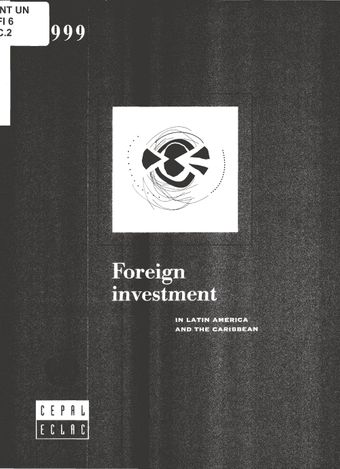Summary and conclusions

- Author: United Nations
- Main Title: Foreign Direct Investment in Latin America and the Caribbean 1999 , pp 15-24
- Publication Date: May 1999
- DOI: https://doi.org/10.18356/e044bcf9-en
- Language: English
This year’s report begins with a discussion of the significant obstacles that stand in the way of a clear understanding of foreign investment, not only because of the difficulties faced by the international and national institutions that produce statistics on foreign direct investment (FDI) —including the differences that exist in methodologies, accounting practices, definitions, country and sectoral coverage, etc., that were discussed in the 1998 edition— but also because of the considerable degree of confusion surrounding normative or legal issues. The explosive increase in bilateral investment treaties, coupled with the multilateral commitments made within the framework of the General Agreement on Trade in Services (GATs), Trade-Related Investment Measures (TRIMs), Trade-Related Intellectual Property Rights (TRIPs) and others, and the investment provisions of free trade agreements, whether already in force (NAFTA, Canada-Chile. Mexico-Chile, United States-Bolivia, etc.) or still under negotiation —as in the case of the Free Trade Area of the Americas (FTAA)— have undoubtedly been a contributing factor in the steep upswing seen in the participating countries’ FDI inflows. However, these instruments have not been of a great deal of help in providing greater insight into the FDI phenomenon itself. In fact, it is quite possible that the plethora of new normative or legal obligations may not fit in with any unified multilateral undertaking on foreign investment agreed to in the future under the aegis of the World Trade Organization (WTO), especially if it is one in which the specific needs of developing countries are better reflected. This suggests that it might be prudent for the Latin American countries to use more caution in assuming further obligations until such time as the multilateral situation is clearer and the FDI phenomenon as such is better understood. Perhaps it is a good time for national decision-makers to focus on defining those priority activities in which they feel FDI can make a substantial contribution to national development goals and then on designing and implementing policies to facilitate those specific types of FDI.
-
From This Site
/content/books/9789213633649c005dcterms_title,dcterms_subject,pub_keyword-contentType:Journal -contentType:Contributor -contentType:Concept -contentType:Institution105

